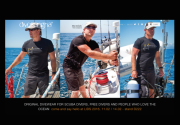
‘Avenues Magazine’ article
Published on Sunday, April 23rd, 2006, under Media
The challenge: To cross one of the roughest most unforgiving and most unpredictable stretches of water in the world in a tiny, poorly maintained, open wooden boat.
 Just what, pray tell is going on in Cook Strait these days? This troubled and turbulent stretch of water is attracting far more than its fair share of media attention of late. It is the very stuff of which Boys’ Own Paper is made. Or some would have it, ‘Mad Magazine’. The two intrepid sailors who set out to cross the wild waters in an open boat, powered by a scrap of sail, and oars constructed from plywood and broom handles, have been ridiculed, reviled, abused and chastised by police and maritime authorities alike. It’s interesting to wonder just what young Ellis Emmett and companion Sander Verbiest were attempting to achieve in their adventure, apart from an exercise in getting from point A to point B. I mean I know the ferries cost alarm and a leg, and air fares have just gone up by 10 per cent, but this is ridiculous. Part of me though, albeit a small part of me, wants to come to their defense.
Just what, pray tell is going on in Cook Strait these days? This troubled and turbulent stretch of water is attracting far more than its fair share of media attention of late. It is the very stuff of which Boys’ Own Paper is made. Or some would have it, ‘Mad Magazine’. The two intrepid sailors who set out to cross the wild waters in an open boat, powered by a scrap of sail, and oars constructed from plywood and broom handles, have been ridiculed, reviled, abused and chastised by police and maritime authorities alike. It’s interesting to wonder just what young Ellis Emmett and companion Sander Verbiest were attempting to achieve in their adventure, apart from an exercise in getting from point A to point B. I mean I know the ferries cost alarm and a leg, and air fares have just gone up by 10 per cent, but this is ridiculous. Part of me though, albeit a small part of me, wants to come to their defense.
To try to cross one of the roughest, most unforgiving and most unpredictable stretches of water in the world in a poorly maintained, open wooden boat, powered by broom handles, does seem, on the face of it, rather moronic. The pair could have made far better preparations and taken far more precautions for their odyssey. They could have used a better, safer boat, for example. They could have utilized some more reliable form of propulsion – a motor springs to mind. They could have had a radio on board – so far as I’m aware, they neglected to take even a cellphone. They could have done all these things. The things is: they chose not to. In the light of this choice, they set out deliberately as ‘men alone’ and perhaps their attempt should be viewed in this light. It’s when the ‘men alone’ come to grief – are weighed and found wanting – that the dilemma for the rest of us arises. Do we dash to their rescue? Do we move heaven and earth to save the lives that these lunatics appear to hold so cheaply? Or do we leave our ‘men alone’ to their own devices? The answer, if we are to be consistent, is not quite as clear as we might like to think. In fact it may come down to the public perception of what we think worthwhile, and what we consider valueless. In other words, what we like and what we don’t.
Roald Amundsen’s expedition made it to the South Pole. Scott’s got there second and perished on the return journey. Shackleton had numerous adventures down that way, ending up on South Georgia Island, courtesy of an open boat. “Ah,” I can hear you say. “But Shackleton had no option but to take to an open boat, in order to rescue his ice-bound comrades.” True, but he had an option as to whether to have been there in the first place. As did Amundsen, as did Scott, as did Hillary when he crossed that same grim continent using farm tractors. These recognized heroes chose their own destinies, and in some cases sealed their own fates. In what way are they any different from Messrs, Emmett and Verbiest? “Because what Scott and Co were doing was worthwhile,” I hear you reply hotly. “While Emmett and Verbiest’ misadventure was plain stupid. What’s more, the Antarctic explorers were using the very best technology of their day.
So does it come down to what we perceive as ‘worthwhile’, in hand with the equipment used to achieve the goal? We should be careful here. Numerous attempts – some fatal – have been made recently to climb Everest without oxygen, despite that technology being available. Not long ago the doomed Fiennes expedition was hell-bent on an unsupported crossing of the southern continent. The three members of that jaunt took with them only that which they could each drag on a sled, eschewing other technology short of a (sponsored) satellite phone. I seem to remember a New Zealander navigating a trailer-sailer from here to England. I can’t remember these people being reviled as irresponsible fools and madmen.
In terms of what is worthwhile, again we should be careful perhaps.Would the world be a sicker, sadder and less hungry place, had Everest remained a virgin peak? Have the numerous ascents of Mount Cook, with their more-than-a-few fatalities, ever saved a life, fed a child, cured a disease or rescued a soul? We accept the celebrity dictum ‘I climbed it because it was there.’ Should we not extend its terms to – on the face of it – lunatic adventures such as that set out upon Mr Emmett and Verbiest? Ellis Emmett had an interesting observation: “… there are actually few things in this life that really matter. We were really scared out there, but the last thing on your mind is the mortgage.”
Enjoy Avenues.
– Jon Gadsby, editor –





